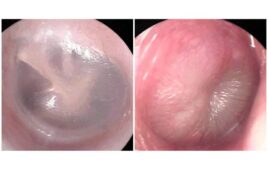A micropump from TTP Ventus is enabling such innovations as Owlstone Medical‘s breath biopsy technology, which is designed to detect early lung or bowel cancers through volatile organic compounds (VOCs).
Officials at The Technology Partnership specifically spun out TTP Ventus to help commercialize the second generation of its signature product Disc Pump.
Disc Pump is a portable, light-weight disc, featuring ultra-low pulsatility for smooth flow with millisecond response times to set-point changes. Disc Pump employs an unusual operating principle: Rather than changing the volume of a chamber, the micropump excites a high-frequency acoustic standing wave in a fixed-volume cavity. It offers silent operation and flexibility to meet product needs for wearables.
The technology was initially developed to address a need in the micro fuel cell market, and now has proven applications across sectors including medical devices, healthcare and scientific research.
Pumping up breath biopsy for cancer
One such application is Owlstone’s ReCIVA breath biopsy, recently named Invention of the Year in the 2017 Top 50 in Digital Health Awards.
Breath samples are collected via Owlstone’s Medical Respiration Collection for In Vitro Analysis (ReCIVA). The Lonestar VOC analyzer identifies chemical biomarkers present even in low concentrations with FAIMS (field asymmetric ion mobility spectrometry), Owlstone’s microchip sensor platform technology. VOC changes occur at the earliest stages of disease, before other physical symptoms are apparent. Detecting these minor changes could enable disease detection, leading to early intervention.
Cancer Research UK predicts that 90 percent of bowel cancer patients will survive for more than 5 years if diagnosed at the earliest stages. Around 70 percent of lung cancer patients will survive for at least a year with early diagnosis, compared with just 14 percent for most people with the most advanced stage of disease.
Billy Boyle, co-founder and CEO at Owlstone Medical, said: “Early detection through improved screening is the greatest opportunity for improving patient outcomes. Owlstone Medical was created specifically to advance our breathalyzer for very early stage diagnosis of disease, to enable more effective treatment and better patient outcomes.”
Disc Pump provides precise sampling and high quality signal detection within ReCIVA. It allows the correct fraction of exhaled breath to be collected for analysis.
The high frequency of operation and low inertia of the Disc Pump operating mechanism enables ReCIVA to capture CO2 levels in less than a millisecond. “Such speed of response offers benefits over conventional motor pumps, which are associated with high levels of inertia,” says James McCrone, managing director, TTP Ventus.
ReCIVA responds in real time to patients’ breathing patterns.
“We are extremely proud and excited to have collaborated with Owlstone on the development of their breath capture platform,” says Tom Harrison, TTP Ventus. “Owlstone’s creativity and vision led to the identification of Disc Pump as a solution to the challenges they were facing, releasing the potential of their breath capture system and elevating the precision and accuracy.”
ReCIVA is approved for use in Europe. It also has CE mark for a pediatric version.
[Want to stay more on top of MDO content? Subscribe to our weekly e-newsletter.]






